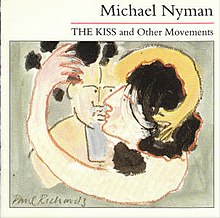
In music, a cadenza, is, generically, an improvised or written-out ornamental passage played or sung by a soloist(s), usually in a "free" rhythmic style, and often allowing virtuosic display. During this time the accompaniment will rest, or sustain a note or chord. Thus an improvised cadenza is indicated in written notation by a fermata in all parts. A cadenza will usually occur over either the final or penultimate note in a piece, the lead-in, or the final or penultimate note in an important subsection of a piece. A cadenza can also be found before a final coda or ritornello.

Michael Laurence Nyman, CBE is an English composer, pianist, librettist, musicologist, and filmmaker. He is known for numerous film scores, and his multi-platinum soundtrack album to Jane Campion's The Piano. He has written a number of operas, including The Man Who Mistook His Wife for a Hat; Letters, Riddles and Writs; Noises, Sounds & Sweet Airs; Facing Goya; Man and Boy: Dada; Love Counts; and Sparkie: Cage and Beyond. He has written six concerti, five string quartets, and many other chamber works, many for his Michael Nyman Band. He is also a performing pianist. Nyman prefers to write opera over other forms of music.

The Life and Opinions of Tristram Shandy, Gentleman, also known as Tristram Shandy, is a novel by Laurence Sterne. It was published in nine volumes, the first two appearing in 1759, and seven others following over the next seven years. It purports to be a biography of the eponymous character. Its style is marked by digression, double entendre, and graphic devices. The first edition was printed by Ann Ward on Coney Street, York.

Drowning by Numbers is a crime comedy-drama 1988 British-Dutch film directed by Peter Greenaway. It won the award for Best Artistic Contribution at the Cannes Film Festival of 1988.

Dagmar Krause is a German singer, best known for her work with avant-rock groups including Slapp Happy, Henry Cow, and Art Bears. She is also noted for her coverage of songs by Bertolt Brecht, Kurt Weill and Hanns Eisler. Her unusual singing style makes her voice instantly recognisable and has defined the sound of many of the bands with whom she has worked.
The Sinfonia Concertante for Violin, Viola and Orchestra in E♭ major, K. 364 (320d), was written by Wolfgang Amadeus Mozart.
Facing Goya (2000) is an opera in four acts by Michael Nyman on a libretto by Victoria Hardie. It is an expansion of their one-act opera called Vital Statistics from 1987, dealing with such subjects as physiognomy, eugenics, and its practitioners, and also incorporates a musical motif from Nyman's art song, "The Kiss", inspired by a Paul Richards painting. Nyman also considers the work thematically tied to his other works, The Man Who Mistook His Wife for a Hat, The Ogre, and Gattaca, though he does not quote any of these musically, save a very brief passage of the latter. It was premièred at the Auditorio de Galicia, Santiago de Compostela, Spain on 3 August 2000. The revision with the cast heard on the album premiered at the Badisches Staatstheater Karlsruhe, Germany, on October 19, 2002. Vital Statistics has been withdrawn. The Santiago version included more material from Vital Statistics. The opera was most recently performed at the 2014 Spoleto Festival USA, located in Charleston, South Carolina.
The Michael Nyman Band, formerly known as the Campiello Band, is a group formed as a street band for a 1976 production of Carlo Goldoni's 1756 play, Il Campiello directed by Bill Bryden at the Old Vic. The band did not wish to break up after the production ended, so its director, Michael Nyman, began composing music for the group to perform, beginning with "In Re Don Giovanni", written in 1977. Originally made up of old instruments such as rebecs, sackbuts and shawms alongside more modern instruments like the banjo and saxophone to produce as loud a sound as possible without amplification, it later switched to a fully amplified line-up of string quartet, double bass, clarinet, three saxophones, horn, trumpet, bass trombone, bass guitar, and piano. This lineup has been variously altered and augmented for some works.

The Michael Nyman Songbook is a collection of art songs by Michael Nyman based on texts by Paul Celan, Wolfgang Amadeus Mozart, William Shakespeare and Arthur Rimbaud. It was recorded as an album with Ute Lemper in 1991, and again as a concert film in 1992, under the direction of Volker Schlöndorff, again with Ute Lemper, though many of the musicians had changed. The songs have been recorded by others and as instrumentals, and are published by Chester Music. The album has been issued by both London Records and Argo Records, though the covers are the same except for the logo.
Memorial is an epic funeral march-like piece, composed by Michael Nyman around 1984–1985. The work premiered on 15 June 1985. It was written to commemorate the deaths of 39 fans, almost all Italian, at the 1985 European Cup final between Liverpool and Juventus at the Heysel Stadium. The whole piece was performed just once. In 1989, Nyman began "reassigning" elements of Memorial, as he often does with earlier work. The first appearance on a commercial recording was of the fifth movement, on the soundtrack of The Cook, the Thief, His Wife & Her Lover. The piece incorporates and builds on a musical sequence from "What Power Art Thou”, an aria from the opera King Arthur by Henry Purcell.

Each in Our Own Thoughts is a 1994 solo album by English experimental music composer and performer Tim Hodgkinson. It is his second solo album, after Splutter (1985), and comprises six unreleased pieces composed by Hodgkinson between 1976 and 1993. They were recorded in 1993 and co-released in 1994 on CD by Woof Records in the United Kingdom and Megaphone Records in the United States.
Noises, Sounds & Sweet Airs is a 1991 opera by Michael Nyman that began as an opera-ballet titled La Princesse de Milan choreographed by Karine Saporta. The libretto is William Shakespeare's The Tempest, as abridged by the composer. The title is derived from Caliban's line, "This isle is full of noises, sounds, and sweet airs, which give delight and hurt not." It premiered in June 1991 in Hérouville-Saint-Clair, Calvados, France, with the L'Ensemble de Basse-Normandie conducted by Dominique Debart. Three members of Saporta's dance company provided the singing.
Tristram Shandy is an unfinished opera project by Michael Nyman based on his favorite novel, The Life and Opinions of Tristram Shandy, Gentleman, by Laurence Sterne, begun in 1981. The project has been perpetually on hold for want of a commission, but at least five excerpts of the opera have been performed publicly, and one has been released on a commercial recording.

The Essential Michael Nyman Band is a studio album featuring a collection of music by Michael Nyman written for the films of Peter Greenaway and newly performed by the Michael Nyman Band. It is the seventeenth album release by Nyman. The album features liner notes by Annette Morreau, who describes the album as "a summation and digest of ten years of progress in the performance of music by a composer -- a composer with whom, so evidently, a group of friends and expert musicians intimately identify their total commitment, virtuosity, and joyous enthusiasm."

Time Will Pronounce: The 1992 Commissions is a 1993 album by Michael Nyman, his eighteenth release. Nyman does not perform on the album, but he composed all the music, produced it, and wrote the liner notes. The album contains four compositions. The album is dedicated to the memory of Tony Simons, "friend, manager, and generous and courageous survivor." The album is named for the second and longest of the four works, the only one featuring a former member of the Michael Nyman Band, Elisabeth Perry.
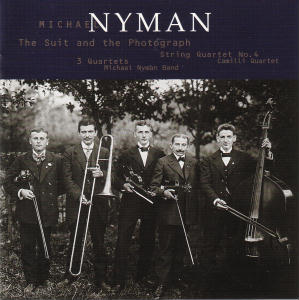
The Suit and the Photograph is a 1998 album by Michael Nyman with the Michael Nyman Band, recorded in 1995. On this album, Nyman is the composer, conductor, and producer, and wrote the liner notes. The album contains two works, String Quartet No. 4 and 3 Quartets. The album is named for its cover photograph by August Sander, which Nyman had associated with the Michael Nyman Band since its inception in 1977. He cites a description of the photograph by John Berger, in an essay of the same title, describing that the suits deform the working class rural men just enough to "undermine physical dignity." Both of the pieces on the album originated in Japan. It is Nyman's second release on EMI and his 33rd in general, but is not designated part of a series, as EMI had done with Concertos. Said Nyman of EMI, "I didn't excite them, and they didn't excite me." Nyman's only further releases on EMI would be the UK edition of Ravenous, featuring remixes by William Orbit, and The Actors, both film scores.
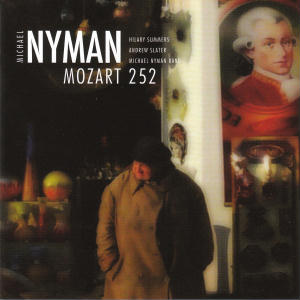
Mozart 252 is a 2008 album by Michael Nyman with the Michael Nyman Band, Hilary Summers, and Andrew Slater, celebrating the 250th anniversary of Wolfgang Amadeus Mozart's birth. Although "Revisiting the Don," one of only two newly written works on the album, was commissioned and performed in 2006, the album's title is a joke on its lateness as an album, released 252 years after Mozart's birth. The album also includes "In Re Don Giovanni," Nyman's first composition for the band, which is based on the first fifteen bars of "Madamina, il catalogo è questo" from Don Giovanni, six selections from Peter Greenaway's film, Drowning by Numbers, in which he was instructed to base the music on the slow movement of Mozart's Sinfonia Concertante K. 364, and two duets and an aria from Nyman's television opera, Letters, Riddles and Writs, in this recording featuring bass Andrew Slater as Leopold Mozart and contralto Hilary Summers as Wolfgang.
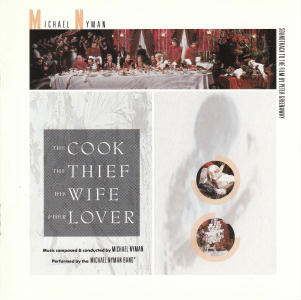
The Cook The Thief His Wife & Her Lover is the twelfth album release by Michael Nyman and the ninth to feature the Michael Nyman Band. It is the soundtrack to the eponymous film by Peter Greenaway. The album includes the first commercially released recording of Memorial, and this is the only piece discussed in the liner notes, to the point that the lyric sheet for "Miserere", the song which Pup the kitchen boy sings, is misidentified "Memorial." "Book Depository" is one of Nyman's many waltzes.
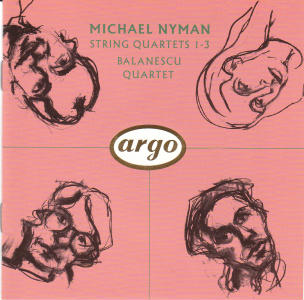
String Quartets 1–3 is a 1991 album by the Balanescu Quartet and the fifteenth release by Michael Nyman. It is the second album of his music on which he did not perform or conduct, though he does provide liner notes. String Quartet No. 3 is built out of Out of the Ruins and became a fixture in numerous Nyman film scores in the 1990s.
